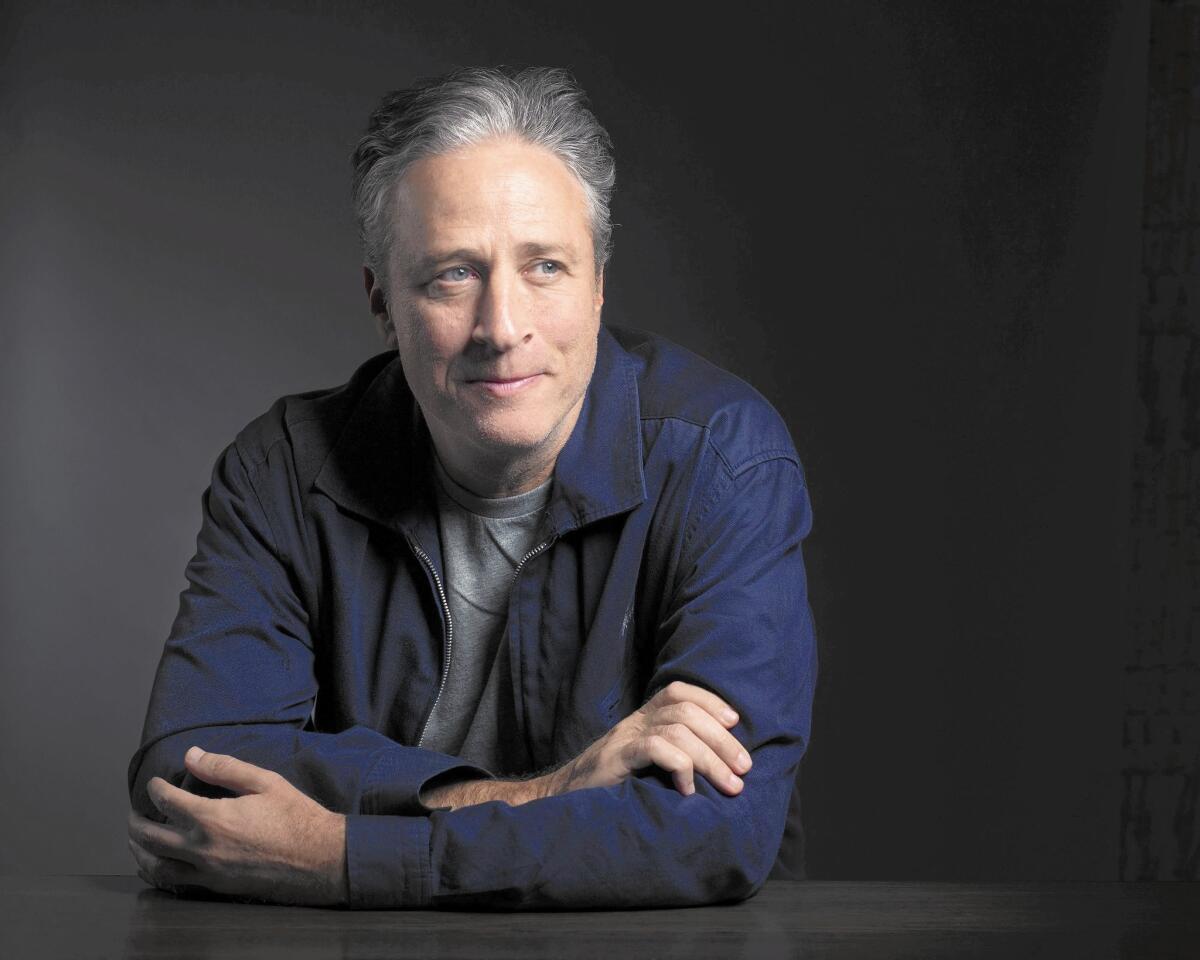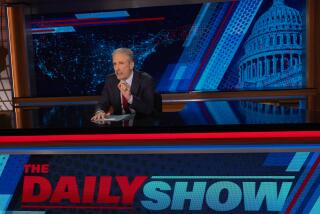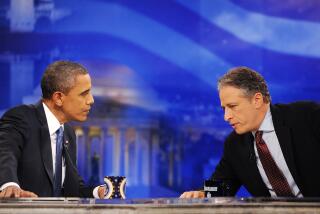When Jon Stewart ranted and joked on ‘The Daily Show,’ people listened

Jon Stewart
When Jon Stewart made his debut as host of “The Daily Show” in January 1999, the idea that the comedian then best known for a short-lived syndicated talk show and supporting parts in forgettable movies would one day have the ear of the president would have seemed like, well, a joke.
But as Stewart steps down from his Comedy Central program “The Daily Show” on Thursday night after 16 years, four presidential campaigns and nearly 2,600 episodes, he leaves as more than simply one of the most accomplished humorists of his generation. Though he is loath to admit it, Stewart’s incisive media commentary and pointed satire have made him a singularly influential voice in American politics.
“He’s been a transformational figure,” said Tom Hollihan, a professor at USC Annenberg School for Communication and Journalism. “He’s a comedian, but a comedian who’s taken on important, substantive issues and provided social critiques.”
Full coverage: Jon Stewart’s legacy and the future of ‘The Daily Show’
While its ratings have always been relatively modest, “The Daily Show” under Stewart’s watch has long been required viewing for a certain liberal, coastal-dwelling segment of the population, who look to Stewart as a voice of reason in an increasingly skewed media landscape.
Stewart has become late night’s top-earning host, making a reported $25 million in 2014, as well as its most celebrated, with “The Daily Show” winning the Emmy for variety series for a record 10 years straight. Along with Tony Soprano and Don Draper, he has played a pivotal role in the shift in power and prestige away from the major broadcast networks. He’s also turned “The Daily Show” into a major incubator of comedy talent, helping foster the careers of Steve Carell, Stephen Colbert, John Oliver and many others.
It’s easy to forget that when Stewart began at “The Daily Show,” he was taking over for original host Craig Kilborn, who had left for what was then considered the far more prestigious position at “The Late, Late Show” on CBS. Stewart, who’d been passed over for Conan O’Brien’s job at “Late Night” and turned down a 1:30 a.m. show on NBC, was viewed as late night’s perennial bridesmaid at the time.
He even made light of his runner-up status in the opening of his first episode: “Welcome to ‘The Daily Show.’ Craig Kilborn is on assignment in Kuala Lumpur. I’m Jon Stewart.”
But Stewart quickly distinguished himself from his predecessor, shifting the focus of “The Daily Show” away from the mockery that had defined much of Kilborn’s tenure and toward politically charged satire. It helped that between the Monica Lewinsky scandal, the 2000 presidential election and its subsequent messy recount, Stewart had no shortage of material.
Rory Albanese, an executive producer at “The Nightly Show” who spent 14 years on staff at “The Daily Show,” says the show really “found its footing” during the Bush-Gore campaign.
“I think people really discovered the show at that moment,” he said, pointing to Stewart’s ability to illuminate complicated, arcane subjects — hanging chads, anyone? — through comedy. “Jon’s just so good at taking mass amounts of information and distilling it into delicious, funny little nuggets.”
Ratings for the program have spiked during the presidential campaigns since then, as viewers, particularly younger, left-leaning ones, increasingly turned to “The Daily Show” for information rather than traditional outlets like newspapers or broadcast news.
Stewart’s political acumen has made “The Daily Show” not just essential election-year television, but also a destination for visiting heads of state, campaigning politicians, Washington bigwigs with memoirs to plug, and even sitting presidents. Obama graced the show seven times, three as chief executive.
“I can’t believe you’re leaving before me,” the president said in his final appearance last month. “I’m issuing a new executive order that Jon Stewart cannot leave the show.”
Such is Stewart’s clout that NBC reportedly approached him about replacing David Gregory as moderator of its Sunday morning public affairs show, “Meet the Press.”
It’s little wonder, says Democratic strategist Donna Brazile, who knows from her experience as a “Daily Show” guest that “Jon Stewart did his homework. He knew the issues. You didn’t just go on the show and talk from the side of your head.”
Stewart’s unique role as a quasi-journalist was cemented in the run-up to the invasion of Iraq, when “The Daily Show’s” skeptical take on the case for war set it apart from many traditional news outlets. Here was a quote-unquote fake reporter taking on the role of real muckraker simply by playing clips of then-Vice President Dick Cheney contradicting himself. (The montage-of-hypocrisy would become a signature of “The Daily Show.”)
“That was the highwater mark,” said CNN’s chief Washington correspondent, Jake Tapper, of Stewart’s Iraq war coverage. “He really showed the media what they should be doing.”
Stewart’s run at Comedy Central coincided with the rise of partisan cable news, and as a self-appointed media watchdog he’s frequently skewered CNN, MSNBC and especially Fox News for what he’s called a tendency “toward sensationalism, conflict and laziness.”
In 2004 Stewart made headlines with an appearance on CNN’s “Crossfire,” in which he called hosts Tucker Carlson and Paul Begala “partisan hacks” and said the right-left shoutfest was “hurting America.” CNN canceled the show three months later, with the network’s then president Jonathan Klein saying, “I agree wholeheartedly with Jon Stewart’s overall premise.”
He later gave voice to the nation’s populist outrage in a heavily publicized March 2009 face-off with CNBC’s Jim Cramer. He accused Cramer, and the financial press more broadly, of shirking their journalistic duty and hyping the market in a way that was “disingenuous at best and criminal at worst.” The episode, a public relations disaster for Cramer, was one of the most-watched in the show’s history.
Stewart’s lacerating media critiques — or “takedowns,” to use the parlance of the Internet — also eroded public faith in broadcast journalism, according to a study that found that frequent viewers of “The Daily Show” held negative perceptions of TV news credibility.
“If I were a news executive, I would be terrified,” said the study’s co-author Jeremy Littau, a professor of communication at Lehigh University, who cites the growth of fact-checking outlets like PolitiFact as evidence of Stewart’s influence. “You have an entire generation of viewers that is skeptical of TV news, if not outright dismissive of it.”
An estimated 200,000 admirers turned out at the National Mall in 2010 for the Rally to Restore Sanity and/or Fear, an event that was intended as a display of unity amid a toxic political climate but mostly just proved Stewart’s ability to draw a crowd.
Never mind that Stewart has a somewhat conflicted relationship with his own authority, insisting that he’s merely an entertainer even as he grills the likes of Donald Rumsfeld and Judith Miller in Frost-Nixon-style showdowns and uses his pulpit at “The Daily Show” to advocate on behalf of veterans and 9/11 responders.
“Jon’s a comedian first, last and foremost, and always will be,” says “The Daily Show’s” executive producer, Steve Bodow. “But more than other comics, he has a set of interests that has a lot in common with a lot of journalists.”
Stewart’s legacy is most apparent in late-night television, which is likely to bear his fingerprints long after his final moment of zen Thursday night. By all accounts, Stewart is not the kind of host who shows up and reads jokes from the teleprompter, but is a hands-on producer, writer and creative force.
“The Daily Show” has developed an infrastructure that can function without him, as evidenced by John Oliver’s successful stint as guest host in 2013. He’s also nurtured a new generation of late-night stars who’ve moved onto their own shows, including Oliver, Colbert, Larry Wilmore, Samantha Bee and Jason Jones.
Attempts to assess Stewart’s effect on the culture may be premature, since his restlessness does not necessarily equate to permanent retirement. There is the possibility he will direct more films following his well-received debut, “Rosewater,” but his immediate plans reportedly include opening an animal sanctuary in his home state of New Jersey.
Still, Stewart is unlikely to remain quiet for too long, according to those close to him.
“I don’t think Jon’s going to disappear or go build a cabin in the woods,” said Albanese, who is lobbying the comedian to start a Twitter account. “I will miss hearing what Jon has to say.”
He certainly won’t be the only one.
More Jon Stewart:
Jon Stewart’s greatest ‘Daily Show’ interviews
VIDEO: 7 jobs for Jon Stewart after ‘Daily Show,’ according to Twitter
Nobody punctures blowhards better than Jon Stewart on ‘The Daily Show’
More to Read
The complete guide to home viewing
Get Screen Gab for everything about the TV shows and streaming movies everyone’s talking about.
You may occasionally receive promotional content from the Los Angeles Times.





